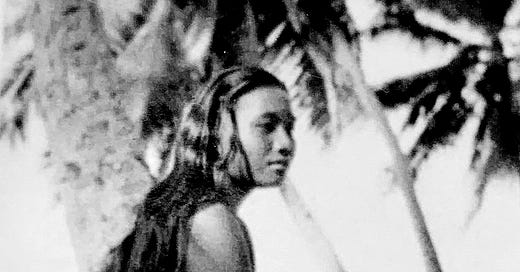A month before Viti sailed from Suva, Adolf Hitler had launched his invasion of the Soviet Union. In Asia, Japan was reaching its western most point in China and the possibility of war with the US was growing. While radio operators had a job-acquired knowledge of the world, and all of them had relatives fighting elsewhere, they felt distant from the real war.
The southern end of the Gilberts coast watching chain was Tamana, an island without a lagoon. Even by atoll standards it’s small, just five kilometres long and at its widest 1.25 kilometres across with its 800 or so souls living in the village of Bakaka. Tamana’s radio operator Clifford Pearsall was from a gold mining settlement, Wetherstones in Otago. He was with two soldiers, Joe Parker and Roderick McKenzie. Parker was a share-milker from Tirau in the Waikato. Fifty years on, his family is still around the district, in Matamata and Thames. In modern Kiribati they had good reason for still remembering Parker. McKenzie, 23, was known as a self-reliant bloke who farmed at Kopaki, south of Te Kuiti on the main trunk line. His folks came from Waipu, south of Whangarei. An only son, he was practically blind in one eye and should not have been in the army (although Jack Nichol was effectively blind in one eye and he had been conscripted - which said something about military consistency or New Zealand's growing manpower needs). Such was the longing for getting aboard he learnt the eye-chart off-by-heart and went into Te Kuiti to enlist. His sister Marj, a nurse, warned the recruiter. She went instead with the 2NZEF and served in North Africa. Her brother was not to be defeated and he went to Taumaranui and saw a different recruiter.
‘A very likeable fellow,’ said friend Frank McAdam.
Due north of Tamana was Beru, the Gilbert's headquarters of the London Missionary Society (LMS) and theological school under Reverend Tony Sadd. To the New Zealanders he was a figure of fun, the kind of Englishman that could surely have only existed in parody had he not been present in front of them. A short man, he wore a pith helmet and expansive bombay bloomers that Stan Brown reckoned were too big.
‘He had a very upper crust English accent and he used to come up and say to people “Tony Sadd, aaaaah”,’ Brown said. He could never figure out whether the long exclamation after his name was some kind of joke or an unconscious affectation of an unusual Englishman. LMS accounts say he always introduced himself: ‘Hello I’m Sadd, but I’m not.’
‘He was a completely unaware fellow.’
Sadd served on Beru with a Samoan missionary, Reverend lupeli, who was there with his wife Sera and daughter Simoli who served the theological school. There was tension between the Catholics and the LMS members, so entire atolls tended to be one or the other. Because of Sadd and regular visits by other white men to the island, Allan Taylor was sent to Beru without soldier companions. He had three local radio operators who could help.
Keep reading with a 7-day free trial
Subscribe to Michael Field's South Pacific Tides to keep reading this post and get 7 days of free access to the full post archives.




